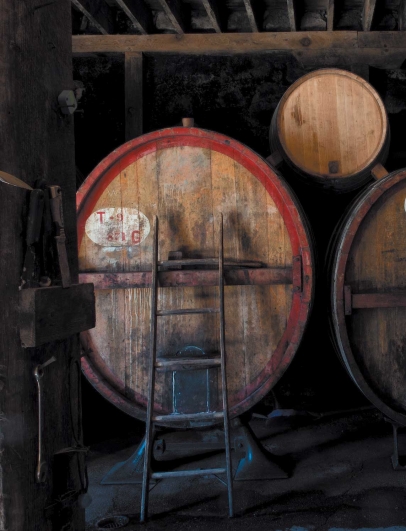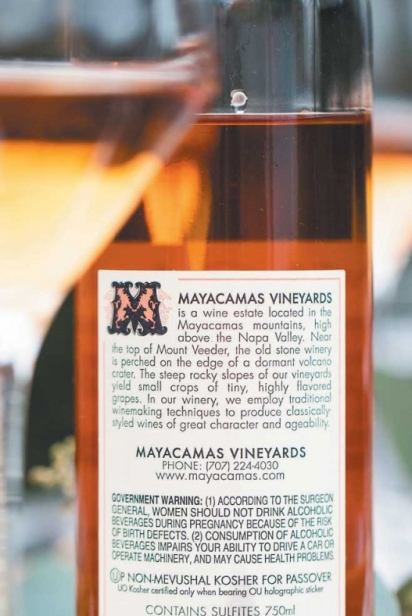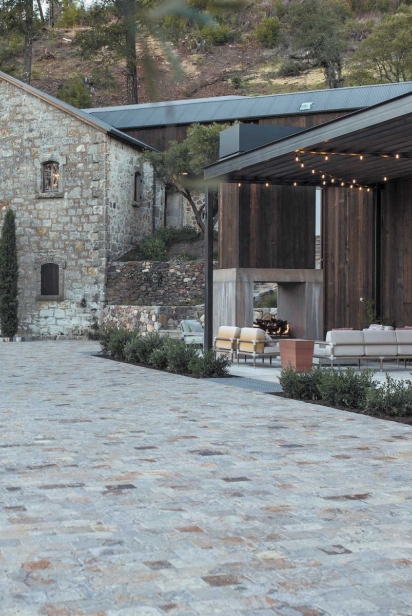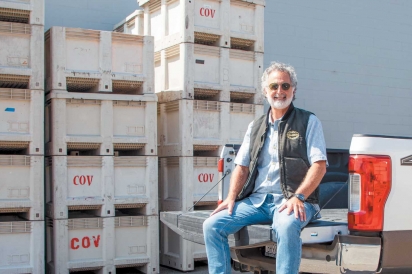Borei Pri Hagafen
Baruch atah A-donay, Elo-heinu Melech Ha’Olam borei pri hagafen.
Blessed are you, L-rd our G-d, king of the universe, who creates the fruit of the vine.
That the Jewish faith has a specific prayer thanking God for creating “the fruits of the vine,” aka wine, is but one indication of the significant role wine plays in many Jewish rituals.
Traditionally, four cups of wine are consumed by each guest during the Seder, the meal that commemorates Passover—though not every participant is required, or likely, to imbibe quite so much. Wine is also traditionally consumed on Shabbat (Sephardic) or Shabbos (Ashkenazi)—the Sabbath, the period that begins every Friday at sundown and continues until sundown the following day.
So it should come as no surprise that Jewish roots run deep in California’s wine industry, from the south to the north. Those roots have grown alongside the roots of the wine industry itself, intertwining in many places and often apparent today if you know where to look for them.
One of the first recorded Jewish residents of Orange County, a German immigrant named Benjamin Dreyfus, was a founding member of the Los Angeles Vineyard Society. Together with Emanuel Goldstein, in 1880 Dreyfus purchased Barth Vineyards, on the Napa side of the Mayacamas. The partners renamed it Mount Pisgah, from the book of Deuteronomy in the Torah (the first five books of the Jewish and Christian Bibles). In 1938, Louis M. Martini purchased the property, thus creating Martini’s famed Monte Rosso Vineyard.
The Goodman brothers, James and George, built a winery in 1886 in the area of Napa known today as Oak Knoll. They called their winery Eschcol, a reference to a fertile vineyard from the book of Numbers, also in the Torah. The Goodmans employed Hamden McIntyre, responsible for some of the most noteworthy architecture in the Napa Valley, to erect a massive three-story winery that is uniquely made of wood rather than locally quarried stone. Today, one drives down Eschcol Lane to get to Trefethen Family Vineyards, where the Goodmans’ impressive wooden winery still stands. In honor of these origins, Trefethen recently launched a wine under the Eschcol label.
Inglenook Winery, established in 1882 by Captain Gustave Niebaum, also shares Jewish roots. Niebaum was a Finnish sea captain who, along with his partners Louis Sloss and Lewis Gerstle, made a fortune in furs, trading and other endeavors. When asked if he was Jewish, Niebaum always responded in the affirmative, though some historians dispute whether he was telling the truth. Sloss and Gerstle, however, were undoubtedly Jewish. The winery the partners built at Inglenook Winery is another architectural wonder created by Hamden McIntyre. Today, the winery welcomes visitors under the auspices of owner Francis Ford Coppola.
Today, there are a number of excellent producers in Wine Country that make kosher wines— translated as “fit,” as in “fit to be consumed.” The designation kosher can apply to all manner of things, including food. Some animals, such as pigs, are not kosher; mixing milk and meat is not kosher (no cheeseburgers). Wine, typically, is not kosher. To produce a kosher wine, the grapes must be handled, from vine to bottle, by observant Jews. In addition, special rabbinically certified equipment is used to make kosher wine, all yeast and additives in the wine must be kosher and no artificial color or flavor can be added to the wine. Sound complicated? It really isn’t. But it does require extra steps.
“The vines are kosher. The fruit on the vines is kosher. Our job is not to make it kosher. Our job is to keep it kosher,” explained Joseph Herzog, vice president of operations at Herzog winery in Oxnard. And yet, there are some additional hoops to jump through in order to make kosher wine. In addition to the yeast and any other additives, kosher barrels must be utilized in the making of kosher wine, and while the wood of a French oak tree is as kosher as the cordon of a Cabernet Sauvignon vine, the sealants that coopers use may not be. Producing kosher wine requires tremendous attention to detail and falls somewhere between being a passion project and a labor of love.
There is a method for producers seeking to make kosher wine who don’t have the ability to staff their operations entirely with observant Jews or, instead, who wish for their wine to be served widely, at weddings or in restaurants. Mevushal (meh- VOO-shuhl) wines can be handled and served by non-Jews, yet remain kosher for consumption by anyone who wishes to keep kosher. The catch? For wine to be mevushal, it has to be heated to 185°F, and since heating wine above even 80°F can threaten its character, this can pose a serious problem. However, flash-pasteurization techniques have advanced to the point that the producers who utilize this method are quite certain that they can meet this requirement without compromising the integrity of their product.
For the lay consumer to determine whether a bottle of wine is kosher, they need simply to read the label. There are any number of symbols that can indicate that a wine has been certified kosher. Many contain Hebrew letters. Many more contain the letter “K”. Still others write out the word “Kosher” depending upon who has certified the wine.
Among those producing kosher wine in Northern California, several stand out. Herzog Wine Cellars is one such, and perhaps the best established. Herzog traces the family lineage back generations, to Rabbi Menachem Herzog and his winery and distillery in Slovakia in the early 19th century. The Herzogs fled violence in the middle of the night, winding up refugees in New York City. Eventually, they made their way to California in 1985. The Herzogs had a “wandering winery” for a while, sourcing fruit and making wine in Napa, Sonoma and Lodi before building their state-of-the-art facility in Oxnard, where the wine is currently produced.
At the head of production at that facility is David Galzignato, who was living and making wine in France until Joseph Herzog came calling. Galzignato, who had made wine with Peter Mondavi at Charles Krug, jumped at the opportunity to return to California and make Herzog his “forever home” in viticulture. “Joseph Herzog and I agreed on where we needed to go, how we would get there and over what length of time. Together we are thoughtfully taking our wines to the next level,” said Galzignato. As with other kosher wineries, kosher is but an element of the broader pursuit of making the highest-quality wine possible. “It’s amazing wine that happens to be kosher,” said David Whittemore, marketing director for Herzog.
And amazing wine it most certainly is. While the entire Herzog portfolio is priced to be accessible and offers a strong quality-price ratio (QPR), of particular note are a series of reserve wines, in particular Cabernet Sauvignons, which maintain the reputation of offering a great value while being undeniably excellent wines. Of particular interest, the Herzog Special Reserve Cabernet Sauvignon from Alexander Valley and the single-vineyard Cabernet from the Warnecke Vineyard, both hailing from Sonoma, are excellent examples of Herzog’s commitment to making high-quality kosher wine.
Hagafen, in the Napa Valley is another storied producer of kosher wines. Ernie Weir moved from Los Angeles to the Napa Valley to work at Domaine Chandon in 1973. In 1979, he made his first wine, 25 cases of rose of Pinot Noir, for himself and for his friends. The following year, he made 300 cases of Riesling, and the year after that, 1981, President Reagan served Ernie’s Riesling to the Israeli Prime Minister at the White House. Today, Hagafen produces a wide variety of wines, ranging from Malbec to Merlot, Cabernet Sauvignon, Pinot Noir, sparkling wine, Syrah, and numerous Rieslings on a spectrum of dry to sweet. All of Hagafen’s wines are kosher, and all of them are very good, though the Rieslings in particular continue to stand out among the crowd. As one reviewer on Vivino wrote, “If it’s good enough for the White House…”.
Covenant Wines is a producer based in Berkeley. Established in 2003, Covenant uniquely boasts an Israeli “sister winery.” Jeff Morgan, Covenant’s founding winemaker, feels that kosher is a “symbolic gesture” and notes that it “is hardly a defining characteristic of what our wines taste like.” Morgan, like Whittemore and others, is focused on quality, and making sure that those who keep kosher can still enjoy wine of the highest caliber. Between the urban winery in Berkeley and the Israeli winery in the Galilee, Covenant produces more than 25 different kosher wines.
“Like any fine wines, ours are characterized by terroir and winemaking protocols, which include native yeast and ML [malolactic] fermentations; sustainable, organic and biodynamic vineyard sourcing; no fining and generally no filtration. If that sounds like ‘natural wine,’ that’s because it is. But we are proud to produce wine that also reflects a rich cultural history and heritage spanning more than two millennia,” said Morgan.
All of Covenant’s wines are delightful. One standout in the portfolio is the “Red C Red” 2018, a beautiful “kitchen-sink” blend of Syrah, Petite Sirah, Malbec and Zinfandel with elegant structure and a gorgeous profile of primary red fruit flavors and aromas. Kosher or otherwise, this is a wine not to be missed.
Another noteworthy producer of kosher wine—a fairly recent and arguably unlikely addition to those making kosher wines—is Mayacamas Vineyards. Yes, that Mayacamas. Established in 1889 in what is today the Mount Veeder AVA, the Schottenstein family, Orthodox Jews, became partners in the winery in 2013, and the same year began producing kosher wine for their personal enjoyment.
Mayacamas uses the same classical techniques for their kosher wines that they do for all the rest, producing small quantities of Cabernet Sauvignon, Chardonnay and a rose made from Grenache. All are 100% varietal and certified kosher by the Orthodox Union.
Prizing the character of the fruit and the unique terroir of the Mount Veeder AVA, Mayacamas’ kosher wines are not mevushal, the intent being to keep them as consistent as possible with their non-kosher wines of the same varietal. The result? Tasted side-by- side, the wines are indistinguishable, the kosher Chardonnay and Cabernet Sauvignon offering the same exceptional quality and stunning flavor profiles as the non-kosher versions that the winery has been producing to wide acclaim for many years.
It is clear that the Jewish community has played a significant part in the history of Wine Country, and continues to be an important part of its current state and future—and one needn’t keep kosher to enjoy the excellent wines they are producing.








